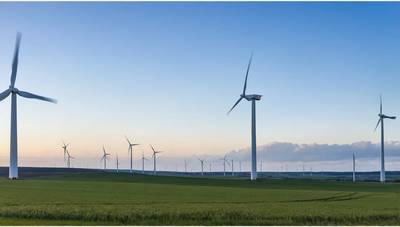Germany's wind energy expansion is picking up but the targets are still not met, according to lobby
The BWE wind lobby reported on Tuesday that Germany's onshore power sector has recorded its best half-year in 2017 but still fell short of legally mandated goals.
Berlin wants to generate 80% of Germany’s electricity using renewable sources by 2030. This goal has been accelerated due to recent reforms, and the decline in Russian fossil fuels imports following the invasion of Ukraine.
In the first six months of 2025, 409 turbines with a capacity of 2.2 gigawatts were installed, an increase of 67% over the previous year. BWE reported that a record 7.8 gigawatts (GW) of projects were approved during this time period, an increase of 55% compared to the first half 2024.
Data compiled by BWE and VDMA Power Systems on behalf of the Wind and Solar Energy Agency showed that the average duration for a permit dropped from 18 months to over 20 percent in the past year.
In a recent statement, BWE's Baerbel Heidebroek stated that "wind energy is on the right track."
BWE stated that despite the positive trend, expansion is still behind the pace needed to reach the targets set out by the Renewable Energy Sources Act, which aims to achieve 115 GW of onshore installed power by 2030.
Katherina Reiche, the new Economy Minister, said that the ministry would review the electricity demand, the energy security, and the progress made in grid expansion and renewable energy to determine if policy adjustments are needed.
The association called for the federal government's commitment to investment certainty and to accelerating grid and infrastructure upgrades. It also urged it to implement swift reforms that would ease repowering, and permit requirements for heavy and large transport. (Reporting and editing by Miranda Murray, David Gregorio and Riham Alkousaa)
(source: Reuters)








